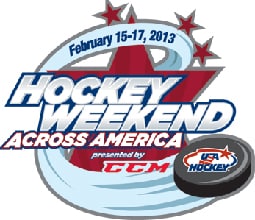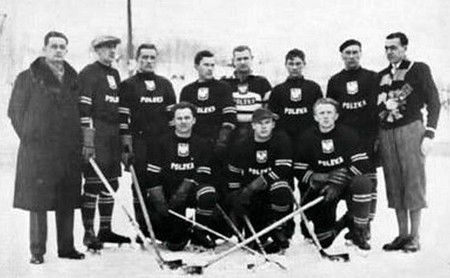
Celebrated Chicago Author Has Detroit Hockey History
WESTLAND— Polish ice hockey is currently in the news. The U-20 National Team earned a spot in next year’s top division IIHF Championships with a 3-2 victory over Italy. Top prospect Kasper Guzik scored all three goals in the come from behind win. You could say it was a collaboration victory, as just like the senior National Team, the U-20’s are led by Russian coaches.
Another skater on the scouting radar is Filip Strarzynski, who had a strong tournament. He is also playing Jr. hockey for the Bismarck Bobcats of the North American Junior Hockey League.

Tom Mustonen was well received as a presenter. He is a primary source. He has lived and become part of the fabric of the hockey history in the State of Michigan and beyond. It was 50 years ago when he and a mostly inexperienced U.S. National Team embarked on Sabena Airlines flight # 548 from New York Idlewild Airport to Brussels. They were starting their International Ice Hockey Federation quest towards the World Championship. At the time, Boston hockey legend, Walter Brown, owner of the Boston Bruins and then Vice-President of the American Hockey Association of the United States said in the Christian Science Monitor, “I don’t see any team with the strength of the Russians or Czech Republic. Our boys may have a rough time of it.”
That was a correct prediction as the U.S. Nationals started their 14 country tour with a group of ex-collegians. USA coach Harry Cleverly of Boston University fame set his first line with Marshall Tschida of Providence College on the right. Cleverly had John Poole who was in the Army, in the center spot and the left-winger Tom Mustonen of Michigan State. The top defensive pair was Frank Silka also of MSU and John Warchol of East Orange, New Jersey.

1932 Polish Olympic Team at Lake Placid that came in fourth place. Aleksander Kowalski scored two goals for Poland and was murdered six years later in the Katyn massacre.
Photo courtesy of the Lake Placid Olympic Museum
Throughout the daylong event, the timeline of hockey in Poland was also showcased. Americans of Polish decent and immigrants who used hockey as an advancement platform were highlighted.
The multi-media presentation moderated by veteran sports broadcaster, Raymond Rolak, highlighted the robust rivalry of the Michigan State and the University of Michigan programs. The unique storyline of the now resurrected University of Detroit collegiate ice hockey team stood out. The U. of D. Titans played their home games at the Olympia in 1967-71 before sparse crowds. An interesting storyline was that attorney Jimmy Williams concluded his collegiate career as the acting player-coach. This was because the head coach, James Kirwen, walked away in disgust. The U. of D. college administration cancelled the major funding for the program with only two weeks to go before the finish of the season. Longtime 3rd Circuit Court Judge, James R. Chylinski was a teammate along with Jim Schlenski and James Bednarski. Pete Mateja was one of the up-and-coming goalies along with pro prospect Pete Donnelly.
Rolak, who has a long hockey pedigree, just completed work in Hawaii as the associate producer for the full length motion picture comedy, “Get A Job”. www.getajobmovie.com. He told of how Detroit defense attorney Robert Plumpe along with Dave Bentley revamped youth hockey by instituting a skill level classification for the 1970 State Championships. Rolak said, “The action revolutionized hockey in America, brought forth a classification system and promoted the growth we have today.” He also presented timelines regarding women’s hockey development, noting the efforts of attorney Walter Bush and Minnesota editor Patti Riha. Bush was the longtime administrator of the Amateur Hockey Association of the United States, the governing body of hockey in this country.
Rolak dissected the 1971 Detroit Common Pleas case allowing the Detroit Catholic Central High School freshman team sponsored by the Detroit Safe-Rai Company to play and be eligible for the City of Detroit Recreation Department (Bantam age-group) Championship. As a 19 year old college freshman, playing baseball at Wayne State University, Rolak wrote an Amicus Brief outlining the merits of school location and the amount of time spent in Detroit as a factor for recreation residency eligibility. The brief turned the tide and for his good faith efforts, the Rev. James Enright, C.S.B., bestowed an honorary C.C. Varsity Hockey Letter to Rolak, only the second award of its kind.
From those C.C. modest house league hockey squads, three of many outstanding teammates stood out. Mike Brown and Steve Banonis went on to play collegiate hockey in the C.C.H.A. and both had brief pro careers. Bryan Gruley, while playing high school hockey, went on to became an All-State defenseman. Gruley, now of Chicago, won a Pulitzer Prize while writing for the Wall Street Journal.
Current metro Detroit area lawyers Walter Piszczatowski and Charles Clos also worked as part time recreation hockey instructors and were appropriate to the action. Clos, now a specialist in youth sports defense litigation said, “We were all Detroit hockey ambassadors. The programs also developed coaches and coaching protocols still in use today.”
Mustonen went on in his segment talking about being global ambassadors, “We ate a lot of sausages from the street vendors in Germany and got to experience Fasching (German Mardi-Gras). We enjoyed the cultural sights also. Frank (Silka) and I both felt fortunate to be able to experience that enrichment. We went to Red Square and were treated very V.I.P. We got invited to the front of the line to see Lenin’s tomb. It was cold and we had our long wool USA parkas on and presented ourselves with grace and diplomacy. We looked sharp as a group.”
After touring with games in Europe, Team USA struggled at the World Championships losing all but two games, defeating West Germany 8-4 and tying East Germany 3-3. The heavy 17-2 loss to Sweden on March 12, prompted a telephone call to the team from President John Kennedy. He wanted to see what he could do to help improve the U.S. hockey program. Kennedy loved hockey, especially Harvard hockey. Mustonen added, “Jack Kirrane who was the USA captain for the 1960 Squaw Valley Olympic Gold medal winners was a Massachusetts friend of President Kennedy.”
Lufthansa, Aeroflot, LOT, KLM, CSA and Aer Lingus were new airline names to seek out in theses transcontinental airports and even stranger were some of the airplanes. “We became experienced international travelers very quickly,” added Mustonen, now a retired educator. “We were immersed in international law and regulations, along with the Cold War and Iron Curtain bureaucrats.”
In that era, players who tried out for the National and Olympic hockey teams paid their own way to training camp. The amateur rules were very strict and making the team required a four-month commitment. Some of the players were already in the military and were subsidized with a small stipend. Others got just $50 a month for expenses. “There was so much talent in Michigan back in the day, Jimmy Siebert, Paul Coppo, goalie Patrick Rupp and of course Jack Roberts, they and many more were capable of NHL careers. Denny Ribant and Al Moran, who both played Major League Baseball, would have had great hockey futures also,” he said.
The ‘63 Worlds were coming off with the awkwardness of the 1962 IIHF Championships held in Colorado Springs. The U.S. got bronze, but neither the Soviet Union nor Czechoslovakia was present in Colorado Springs/Denver in ’62. The two Eastern Bloc countries boycotted the event due to the United States’ refusal to give entry visas to communist-ally East Germany (in protest of the erection of the Berlin Wall just seven months earlier).
Mustonen went on, “Coach Cleverly was an anxious flyer and so on the long flight home from Dublin we sent our two complimentary scotch whiskeys to him. Needless to say, he was very glowing when it was time to deplane. There was a team parade before the tournament and we were presented a small but beautiful crystal drinking vessel with the three Swedish gold crowns on it. Sweden, the spectators and the supporters were gracious hosts.”
“When we played in Poland, it was at an outdoor stadium rink and we had a fierce snowstorm. There was a giant crowd and everyone stayed until the end. The match continued after short intermissions to shovel the ice. We became very popular, as we gave ball point pens to the Polish National Team members. It was a scarce item at the time in the Soviet bloc countries. Needless to say, we ran out of them. You could see that the people were not happy with the Russian interference intruding on their lives. It permeated everywhere, it was very noticeable,” Mustonen added.
Of great interest was the documentation of the 1959 Michigan State ice hockey team which was officially declared as the first Big Ten Conference Hockey Champions. This allowed them to go to the NCAA finals in Troy, New York, hosted by RPI. This history will be vital to the pedigree of the new Big Ten Hockey Conference which is to have six schools next year. The branding and scheduling will be a valuable property for the Big Ten Network (television).
This May, USA Hockey will send N.H.L. players to represent America in the top group of countries participating in the IIHF Worlds. USA will play its first game versus Austria on Saturday May 4. There will be 16 countries competing in the top division. Team Russia is the defending World Champions.

Raymond Rolak and Tom Mustonen, presenters at Hockey Day in Michigan event, celebrate longtime youth hockey supporter Stan Stankiewicz who was a fixture in the Polonia community of Westside Detroit. Photo by Ken Garner
Rolak concluded with humorous reminiscing regarding Red Berenson and Mel Wakabayashi and the special relationships among the college coaches, John Mariucci, Al Renfrew, Len Ceglarski and Amo Bessone. He also highlighted the many National Championship teams from the metro Detroit area. Mustonen smiled and added, “Berenson was fast-tracked for the U. of M. Law School after his All-America season with the Wolverines. Pro hockey got in the way. He has been a compliment and the benchmark as the University of Michigan head coach.”
Afterward, description and clips were shown regarding the making of the 1987 award-winning docu-drama, “The Hobey Baker Story” which had been narrated by Rolak and produced in Minneapolis.
EDITORS NOTE: Hockey inductees into the National Polish American Sports Hall of Fame include Len Ceglarski, Turk Broda, Tom Lysiak, Ed Olczyk and Pete Stemkowski.
Szymon Szember contributed


